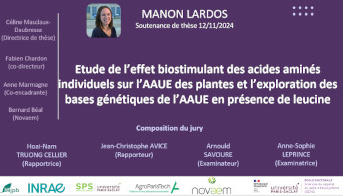Thesis defense: Manon Lardos
Tuesday, November 12th 2024, 2 pm, INRAE, Versailles
Study of the biostimulante effect of individual amino acids on plant AAUE and exploration of the genetic basis of plant AAUE in the presence of leucine
The interest in using biostimulants in agriculture is growing, fuelled by scientific advances that demonstrate their effectiveness in promoting plant growth and enhancing plant resistance to biotic and abiotic stresses. The scientific community is actively researching the effects of different classes of biostimulants and striving to understand their modes of action. Among these biostimulants, protein hydrolysates are notable for their contribution to the circular economy, since they are produced from by-products of other industries. They are primarily composed of amino acids. Although the literature reports the efficiency of protein hydrolysates on many plant performance traits, it does not detail the individual effect of their major compounds or their mode of action.
The first objective of my thesis was to analyse which of the 20 proteinogenic amino acids had a biostimulant effect on Arabidopsis and to explore the genetic basis of this response. To archive this, I set up in vitro cultures of Arabidopsis in the presence of nitrate and amino acid. We developed an Amino Acid Use Efficiency (AAUE) index to quantify the biostimulant effect of amino acids in the presence of nitrate. This experimental set-up enabled us to identify 3 groups of amino acids with beneficial, neutral or adverse effects on plant AAUE. Based on these results, we sought to determine whether the beneficial amino acids had a biostimulant effect. The experimental set-up described above was used to test concentration ranges of asparagine and glutamine, demonstrating their biostimulant effect on plant AAUE, even at very low concentrations. Their biostimulant effect was confirmed using their L and D enantiomeric forms.
The second objective of my thesis was to use the experimental set-up described above to carry out a GWAS in order to determine the genetic basis of AAUE in the presence of leucine in Arabidopsis. Since leucine has an inhibitory effect on growth, its presence in the medium made it possible to study the response of the plants without being hampered by the variations in growth of the genotypes in the nitrate collection.
In conclusion, this PhD project demonstrates the potential of individual amino acids as biostimulants for plants and provides a better understanding of the genetic basis of AAUE in the presence of an amino acid.
The interest in using biostimulants in agriculture is growing, fuelled by scientific advances that demonstrate their effectiveness in promoting plant growth and enhancing plant resistance to biotic and abiotic stresses. The scientific community is actively researching the effects of different classes of biostimulants and striving to understand their modes of action. Among these biostimulants, protein hydrolysates are notable for their contribution to the circular economy, since they are produced from by-products of other industries. They are primarily composed of amino acids. Although the literature reports the efficiency of protein hydrolysates on many plant performance traits, it does not detail the individual effect of their major compounds or their mode of action.
The first objective of my thesis was to analyse which of the 20 proteinogenic amino acids had a biostimulant effect on Arabidopsis and to explore the genetic basis of this response. To archive this, I set up in vitro cultures of Arabidopsis in the presence of nitrate and amino acid. We developed an Amino Acid Use Efficiency (AAUE) index to quantify the biostimulant effect of amino acids in the presence of nitrate. This experimental set-up enabled us to identify 3 groups of amino acids with beneficial, neutral or adverse effects on plant AAUE. Based on these results, we sought to determine whether the beneficial amino acids had a biostimulant effect. The experimental set-up described above was used to test concentration ranges of asparagine and glutamine, demonstrating their biostimulant effect on plant AAUE, even at very low concentrations. Their biostimulant effect was confirmed using their L and D enantiomeric forms.
The second objective of my thesis was to use the experimental set-up described above to carry out a GWAS in order to determine the genetic basis of AAUE in the presence of leucine in Arabidopsis. Since leucine has an inhibitory effect on growth, its presence in the medium made it possible to study the response of the plants without being hampered by the variations in growth of the genotypes in the nitrate collection.
In conclusion, this PhD project demonstrates the potential of individual amino acids as biostimulants for plants and provides a better understanding of the genetic basis of AAUE in the presence of an amino acid.
Director: Céline Masclaux-Daubresse - INRAE, IJPB, Versailles, SATURNE team
Co-Director: Fabien Chardon - INRAE, IJPB, Versailles, SATURNE team
Co-Supervisor: Anne Marmagne - INRAE, IJPB, Versailles, SATURNE team
Members of the jury:
> Hoai-Nam Truong Cellier (Rapportrice) - INRAE, Agroécologie, Dijon
> Jean Christophe Avice (Rapporteur) - Université de Caen, EVA
> Arnould Savouré (Examinateur) - Sorbonne Université, IEES, Paris
> > Anne-Sophie Leprince (Examinatrice) - Sorbonne université, INRAE, IJPB, Versailles
To attend, contact Céline Masclaux-Daubresse
Research developed at the Institute Jean-Pierre Bourgin for Plant Sciences.
Back
